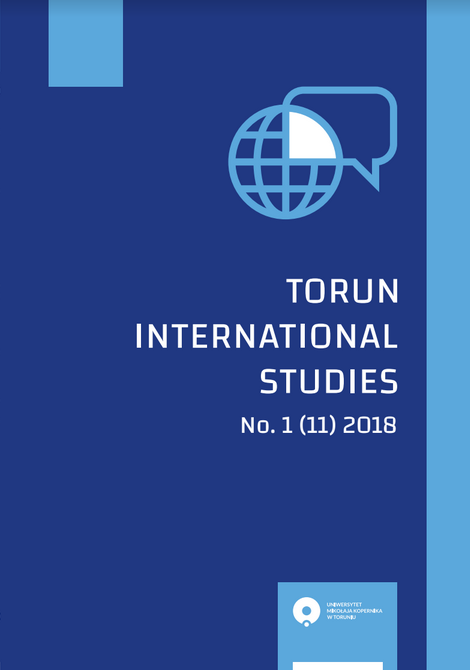“GREENING” THE CRITICAL THEORY OF INTERNATIONAL RELATIONS WITH THE CONCEPT OF WORLD-ECOLOGY
DOI:
https://doi.org/10.12775/TIS.2018.011Keywords
theory of international relations, critical theory, environmental issues, world-ecology, CapitaloceneAbstract
The article signals the need for a deepened theoretical analysis of environmental issues in International Relations studies. It initializes the idea of “Greening” the Critical Theory of International Relations with critical concepts from other sciences. Thus it proposes the scope of Critical Theory of IR to be expanded to cover not only the relations between power and capital, but the relations of power-capital-nature. It shows common points between the Critical Theory of IR and the concepts of world-ecology and the Capitalocene by Jason W. Moore and proposes reforming some founding definitions that the Critical Theory of IR is based on. This includes re-conceptualizing the critique of capitalism as a way of organizing nature, but also distancing oneself from the Cartesian dichotomy of Society + Nature, which is an obstacle to properly including environmental issues in IR research. The article aims to find some way of incorporating the concepts of world-ecology and the Capitalocene by Jason W. Moore into the Critical Theory of International Relations, thus “Greening” it and updating it to be able to exert some influence upon the ways of thinking about and researching the biggest threat that humanity has ever faced and its relation to the contemporary international relations.References
Angus, I. (2016). In Defense of Ecological Marxism: John Bellamy Foster responds to a critic. Retrieved December 13, 2018, from https://climateandcapitalism.com/2016/06/06/in-defense-of-ecological-marxism-john-bellamy-foster-responds-to-a-critic/.
Bińczyk, E. (2018). Epoka człowieka. Retoryka i marazm antropocenu. Warszawa: Wydawnictwo Naukowe PWN.
Bógdał-Brzezińska, A. (2012). Postkolonialne dziedzictwo niezachodnich koncepcji stosunków międzynarodowych. In: Gawrycki M. F., Zajączkowski J., & Bógdał-Brzezińska A. (Eds.), Re-Wizje i Re-Orient-acje. Myśl pozaeuropejska w nauce o stosunkach międzynarodowych. Warszawa: Wydawnictwa Uniwersytetu Warszawskiego.
Burchill, S., Devetak, R., Linklater, A., Paterson, M., Reus-Smit, Ch., & True, J. (2006). Teorie stosunków międzynarodowych. Warszawa: Książka i Wiedza.
Busby, J. (2018). Warming World. Why Climate Change Matters More Than Anything Else. Foreign Affairs, 97(4), 49-55.
Connolly, W. E., & Macdonald, B. J. (2015). Confronting the Anthropocene and Contesting Neoliberalism: An Interview with William E. Connolly. New Political Science, 37(2), 259-275.
Crosby, A. W. (1999). Imperializm ekologiczny. Biologiczna ekspansja Europy 900 – 1900. Warszawa: Państwowy Instytut Wydawniczy.
Crutzen, P. J. (2002). Geology of mankind: The Anthropocene. Nature, 415(23).
Crutzen, P. J., & Stoermer, E. F. (2000). The “Anthropocene”. IGBP Global Change Newsletter, 41, 17-18.
Czaputowicz, J. (2007). Teorie stosunków międzynarodowych. Krytyka i systematyzacja. Warszawa: Wydawnictwo Naukowe PWN.
Diamond, J. (2000). Strzelby, zarazki, maszyny. Losy ludzkich społeczeństw. Warszawa: Prószyński i S-ka.
Duvall, R., & Varadarajan, L. (2003). On the Practical Significance of Critical International Relations Theory. Asian Journal of Political Science, 11(2), 75-88.
Falk, R. (2016). On the Legacy of Robert W. Cox. Globalizations, 13(5), 501-505.
Foster, J. B. (2000). Marx’s Ecology. New York: Monthly Review Press.
Gawrycki, M. F., Zajączkowski, J., & Bógdał-Brzezińska, A. (2012). Re-Wizje i Re-Orientacje. Myśl pozaeuropejska w nauce o stosunkach międzynarodowych. Warszawa: Wydawnictwa Uniwersytetu Warszawskiego.
Green, J., & Hale, T. (2017). Reversing the Marginalization of Global Environmental Politics in International Relations: An Opportunity for the Discipline. PS: Political Science & Politics, 50(2), 473-479.
Jackson, R., & Sørensen, G. (2012). Wprowadzenie do stosunków międzynarodowych. Teorie i kierunki badawcze. Kraków: Wydawnictwo Uniwersytetu Jagiellońskiego.
Keohane, R. O. (2015). The Global Politics of Climate Change: Challenge for Political Science. PS: Political Science & Politics, 48(1), 19-26.
King, A. D., & Harrington, L. J. (2018). The inequality of climate change from 1.5 to 2°C of global warming. Geophysical Research Letters, 45, 5030–5033.
Lewis, S. L., & Maslin, M. A. (2015). Defining the Anthropocene. Nature, 519, 171-180.
Loughlin, N. J. D., Gosling, W. D., Mothes, P., & Montoya, E. (2018). Ecological consequences of post-Columbian indigenous depopulation in the Andean–Amazonian corridor. Nature Ecology & Evolution, 2, 1233-1236.
Mikewicz, P. (2006). Pomiędzy banałem a absurdem: Istota teorii stosunków międzynarodowych. In: Dyduch, J., Mikiewicz, P., & Rzeszótko S., Krytyczne wprowadzenie do teorii stosunków międzynarodowych. Wrocław: Oficyna Wydawnicza Arboretum.
Moore, J. W. (2015). Capitalism in the Web of Life. Ecology and the Accumulation of Capital. Verso.
Moore, J. W. (Ed.). (2016). Anthropocene or Capitalocene? Nature, History, and the Crisis of Capitalism. PM Press.
Moore, J. W. (2017a). A History of the World in Seven Cheap Things. A Guide to Capitalism, Nature, and the Future of the Planet. Berkeley: University of California Press.
Moore, J. W. (2017x). Confronting the Popular Anthropocene: Toward an Ecology of Hope. New Geographies, 09, 186-191.
Moore, J. W. (2017c). Metabolic Rift or Metabolic Shift? Dialectics, Nature, and the World-Historical Method. Theory & Society, 46, 285-318.
Moore, J. W. (2017d). The Capitalocene, Part I: On the Nature and Origins of Our Ecological Crisis. The Journal of Peasant Studies, 44(3), 594-630.
Paterson, M. (2005). Green Politics. In: Burchill et al., Theories of International Relations. PALGRAVE MACMILLAN.
Steffen, W., Sanderson, A., Tyson, P., Jäger, J., Matson, P. A., Moore, III B., Oldfield, F., Richardson, K., Schellnhuber, H. J., Turner, II B. L., & Wasson, R. J. (2004). Global Change and the Earth System: A Planet Under Pressure. Berlin-Heidelber-New York: Springer-Verlag.
Walentowicz, H. (2001). Program teorii krytycznej Maxa Horkheimera. Nowa Krytyka, 12, 5-40.
Wallerstein, I. (2007). Analiza systemów-światów. Wprowadzenie. Warszawa: Wydawnictwo Akademickie DIALOG.
Welzer, H. (2010). Wojny klimatyczne. Za co będziemy zabijać w XXI wieku? Warszawa: Wydawnictwo Krytyki Politycznej.
Downloads
Published
How to Cite
Issue
Section
Stats
Number of views and downloads: 560
Number of citations: 0



